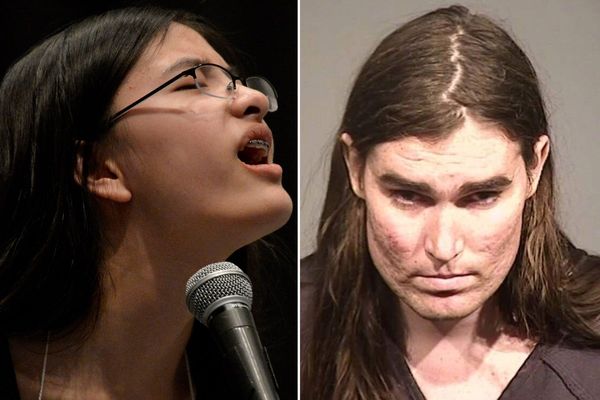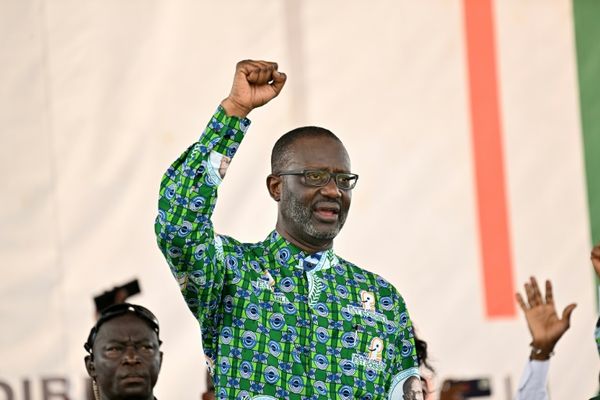
From the capital, Kyiv, to the heavily attacked region of Kharkiv, news of Oleksandr Usyk’s win over Tyson Fury brought war-weary Ukrainians a rare and very welcome moment of victory and celebration.
Usyk, who became the first undisputed world heavyweight champion this century after his victory in Riyadh in the early hours of Sunday, said his triumph did not belong to him alone.
“It’s for my God, my supporters, my country, the Ukrainian soldiers, Ukrainian mothers and fathers, children,” he said.
Although Fury initially suggested the judges were “siding with someone whose country is at war”, the people of Ukraine would not let anything tarnish a win they viewed as a big symbolic achievement.
In a park near Kyiv’s velodrome, Usyk’s victory was a matter of joy to those enjoying the warm May sunshine.
“We are proud and happy – really happy to have such news,” said Karina Kivernyk, a communications specialist. “Every Ukrainian victory is significant, because it symbolises the strength of Ukraine against the Russian aggressor.”
Mary Kravets, a student who had watched the fight, agreed that the outcome of the showdown would prove a huge boost to the national psyche.
“It was amazing,” she said. “Ukraine won. And he shows everyone the strength and independence of the country.”
Even those who are more lukewarm about boxing acknowledged the psychological and propaganda advantages of the win.
“All I know about it is that Drake lost half a million dollars betting on the match,” said Ihor Sydorenko, a music producer and student with little time for the sport. Still, he added, “if it helps strengthen morale, it’s good, and brings hope that Ukraine will prevail”.
In Kharkiv, the north-eastern city that has come under intense bombardment in recent weeks, many people stayed up late to watch the fight. “It was really important to see Usyk winning this fight, and especially good to see a Crimean Ukrainian showing such a great example,” said Eugene Navolokin, 32.
“He was killing him; he destroyed Fury, like our soldiers on the frontlines doing their job,” said Bohdan Ivasenko, 29.
That sentiment was echoed by Ukraine’s president, Volodymyr Zelenskiy.
“The Ukrainians hit hard! And in the end, all our opponents will be defeated,” he wrote on Telegram soon after the fight.
Zelenskiy added that Usyk’s success showed that “Ukrainian endurance and strength give birth to Ukrainian victory”.
The mayor of Kyiv, Vitali Klitschko, a former world heavyweight champion boxer, also noted that Usyk had “showed the world that Ukrainians are capable of defeating a strong opponent in a difficult fight”.
“This victory is a very important victory for Ukraine today,” said Klitschko, who held the WBO and WBC titles at different times.
His younger brother, Wladimir Klitschko – another former heavyweight world champion – was ringside in Saudi Arabia and echoed his sibling’s words.
“Can you imagine how much pressure this man had these past weeks and here in this ring? Losing was not an option,” he told Sky Sports.
“It doesn’t matter how big, how tall, how heavy, what his reach is and how mobile Tyson Fury was, Oleksandr Usyk showed he is the best fighter in modern history.
“I’m very proud of Oleksandr Usyk and I’m very proud to be Ukrainian.”
Usyk’s triumph may also help dampen some of the criticism he has drawn in the past for his attachment to the Ukrainian Orthodox church, a branch of the Orthodox communion loyal to the Moscow patriarchate.
In 2021, Usyk, who grew up in Crimea, was criticised for appearing in a documentary about the Pechersk Lavra, the ancient Kyiv monastery then inhabited by monks under the Moscow patriarchate’s authority. He also angered many Ukrainians in the immediate aftermath of Russia’s invasion by appearing to use the fraternal rhetoric favoured by Vladimir Putin when he appealed to Russia to abandon its offensive “if you consider us brotherly people”.
Additional reporting by Borys Shelahurov and Agence France-Presse







